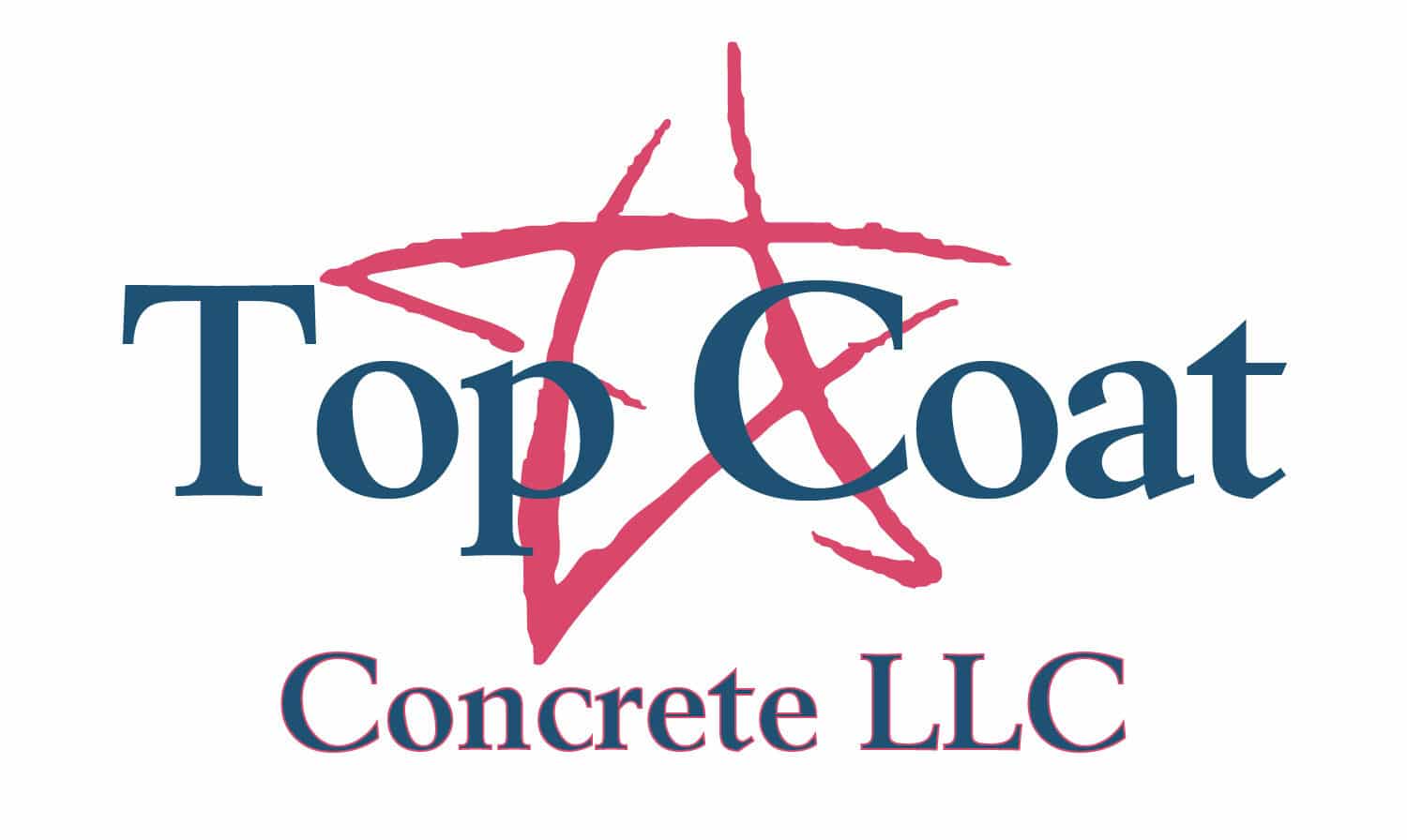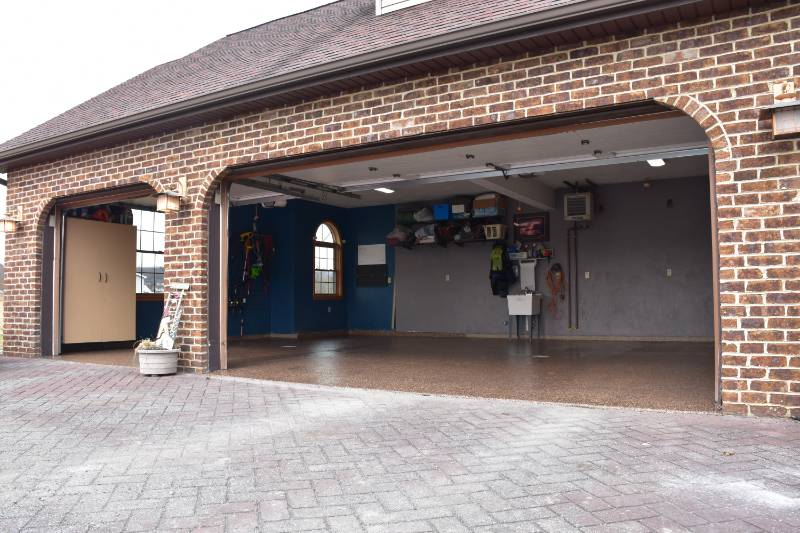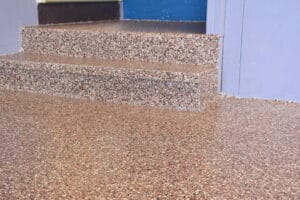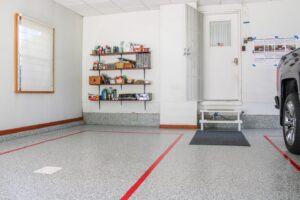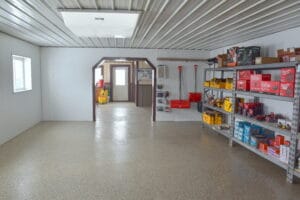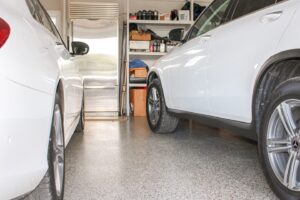One of the top questions we get – and for good reason – is how much money our customers can expect to invest when planning to epoxy their garage floor for durability.
- Prices will vary by location, but at Top Coat Concrete we generally tell customers to expect at least $4 per square foot to coat their garage floor. Garage floor coating pricing can vary by the size of the space, the amount of repair work required prior to coating, and how many “fixtures’ we have to work around.
First Things First: You Don’t Actually Want “Epoxy”
Before we jump into epoxy garage floor pricing, we should get one thing straight: while most people think of “epoxy” for their concrete garage and basement floors, you really want to be using a polyaspartic coating, which is a little different than traditional epoxy.
Epoxy refers to a specific formula and garage floor coating product – true epoxy is a two-part resin that dries to an extreme hardness. But epoxy isn’t really the right solution for most garage floors for two reasons:
- Garage floor epoxy dries SO hard that it has no “give.” This matters on a concrete garage floor because the underlying concrete expands and contracts by small amounts as it cools and warms throughout the day and the seasons. Over time, epoxy can crack and splinter from these small changes, meaning that epoxy won’t stand up as well in the long-haul.
- Epoxy yellows when exposed to ultraviolet light – which is any sunlight that might hit your garage floor. For some basement floors, epoxy can be just fine because it receives so little daylight, but if you care about the look of your garage floor for years to come, you don’t want it turning yellow!
Polyaspartic coatings are the modern spin on epoxy: strong and durable, polyaspartic coatings have enough “flex” to accommodate the imperceptible changes in concrete over time, and they also won’t yellow when exposed to the sun!
For these reasons, polyaspartic coatings are what almost every professional epoxy garage flooring company is actually installing.
It’s fine to call garage floor coatings “epoxy” as a generic term, but understand that if you really care about your floor, you want polyaspartic.
Factors Affecting Epoxy Garage Floor Cost
Professionally installed epoxy garage floors typically cost from $4 to $8 per square foot, and the exact price will vary based on the following factors.
Garage Floor Size
First and foremost is square footage. How large is the garage in which you’re considering an epoxy coating?
For professional installation, this is as simple as measuring the dimensions and area of the garage floor. For weekend warriors, it’s as simple as measuring the floor and then understanding how far the coating you’ve purchased will go. Most 1-gallon, store-bought epoxies (which we don’t recommend), will cover about 300 square feet.
It’s also important to know that for larger spaces, the price per square foot of professionally installed epoxy garage floor coatings goes down! Why? Some of the labor involved in installing epoxy coatings on an existing garage floor is related to setup and cleanup, which is the same whether we’re coating a 50 sq. ft space or a 500 sq. ft. space.
The Number of Epoxy Coats
Most polyaspartic coatings for garage floors are designed for adhesion, scratch-resistance, and flexibility at less than ¼ inch.
Our normal procedure is to apply one coat of polyaspartic coating on garage floors, but some homeowners or businesses do ask for two clear coats. That will increase the price due to more materials and labor involved.
Because true epoxies don’t “adhere” as well to the underlying surface, you may need a thicker coating to gain the same performance as a polyaspartic coating. This will factor into your epoxy coating cost.
The Quality of Your Concrete Floors
Concrete repairs will increase the cost of your epoxy garage floor, but you’ll be glad we did them.
If there are pitted areas or cracks in your concrete floor, this can increase epoxy floor coating costs.
Because these cracks, dents, and divots can compromise the integrity of your epoxy or polyaspartic coating over time, we believe the effort to repair the concrete is well worth it. Of course, this labor takes time – though our customers are generally happy to have their floor done right.
To fix problems with the underlying surface, we cut out the concrete around cracks and divots, clean out the raw concrete, and fill these voids with a fast-curing polyurea filler, which hardens before we grind the filler flush with the concrete once again.
This work is included in your original quote and not added as a surprise cost – you’ll know what your price is from the start.
Additional Epoxy Flooring Cost Considerations
Other considerations when it comes to the price of an epoxy garage floor coating include:
- Fixtures that we must work around or replace. This might include old rusted garage floor drains that should be replaced before we apply a coating, or rusted support poles.
- Additional or atypical surfaces, like stairs where we need to apply a coating to the vertical space, or cove bases, where we bring the coating partway up the wall. Cove bases are most common in commercial settings where you want water to run away from the wall when cleaning, like restaurants, butcher shops, or car-washing and car-detailing facilities.
- Other aesthetic preferences like decorative flakes, metallic pigments, or metallic epoxy generally don’t increase costs significantly, but they can increase an epoxy garage floor cost depending how fancy you want to get!
DIY or Pay the Professionals?
Considering epoxy floors for your next 3-day weekend?
Epoxy garage floors – or more precisely, polyaspartic garage floors – will perform for years as a reliable way to protect your concrete slab, save money on repair costs to concrete surfaces, and simply look great for you and your visitors! They’re easy to clean, chemical resistant, and keep dust down compared to uncoated concrete.
In fact, they’re one of the most common DIY home improvement projects that weekend warriors like to take on.
But a durable, long-lasting, perfect-looking epoxy floor requires true professional installation. An epoxy flooring contractor like Top Coat Concrete can help you avoid common pitfalls, get the project done quickly (usually in one day), and create a seamless, easy-to-clean garage floor without breaking the bank.
Beautifying your epoxy floor with a professional install is one of the more cost-effective projects to outsource.
Professional Epoxy Garage Floor Cost Examples
- A modern 24×24 two-car garage with concrete in great shape: around $2,300
- A modern 24×36 three-car garage with concrete in good shape with three drains: around $5,000
- An older 20×20 shop with pitted concrete and some repairs necessary: around $2,400
Get a Concrete Epoxy Quote In Pittsburgh
If you’re considering a garage floor coating near Pittsburgh, we’d love to give you our advice, suggestions, and a free quote. No high-pressure sales, just our professional opinion on the right move for your garage floor. Call or get in touch through our website to set up your free consultation today.
Other Common Questions About Epoxy Garage Floor Costs
How long is the curing process for an epoxy or polyaspartic floor?
Most epoxy flooring systems (or polyaspartic if you’re doing it right!) can be done in a single day and dry by the end of the following day.
True epoxies can take longer to cure: as long as seven days in some cases.
Does an epoxy garage floor increase my home’s value?
Yes, an epoxy garage floor can increase your home’s value, though it won’t always. A good epoxy floor coating provides a clean and polished look, is highly durable, and requires minimal maintenance – for you and future homeowners. Potential buyers often see this as a premium feature, as it enhances the appearance of the garage and provides a protective layer against stains and damage. Remember, not everyone appreciates or cares about a beautiful garage floor quite like you and I do – but to the right buyer, it can make all the difference in value.
What’s cheaper: epoxy flooring or tiles?
Generally speaking, epoxy flooring tends to be more cost-effective than tiles. The exact cost can vary based on factors like the quality of materials, the complexity of the installation, and the region where you live. Tiles usually require more extensive preparation, labor, and materials, which can drive up the cost. However, it’s essential to consider the long-term value, as epoxy flooring might be more durable and require less maintenance over time.
How long will the epoxy garage floor last?
An epoxy garage floor, or polyaspartic in most cases, can last anywhere from 10 to 20 years depending on the quality of the materials used and the installation process. Proper preparation of the surface and the use of a high-quality, professional-grade formula can significantly extend the lifespan. Regular cleaning and avoiding excessive wear and tear will also contribute to its longevity.
How do you repair concrete under an epoxy coating?
Epoxy or polyaspartic coatings will not fix cracks in the concrete surface on their own, and you will probably see the crack again at a later point.
To fix it properly, the problem area is cut out, filled, and ground down to be flush with the surrounding concrete floor system. For large voids or repairs, we use a cement-based compound. For small cracks and divots, we use a fast-drying polyurea formula that won’t hold up completing the rest of the coating project.
Can you damage epoxy flooring?
You can! One of the most common epoxy floor complaints (which doesn’t happen with polyaspartic) is that it can lose adhesion where hot car tires rest on the surface repeatedly. This warm, regular exposure slowly breaks down the adhesive bonds, and eventually the epoxy delaminates from the surface.
